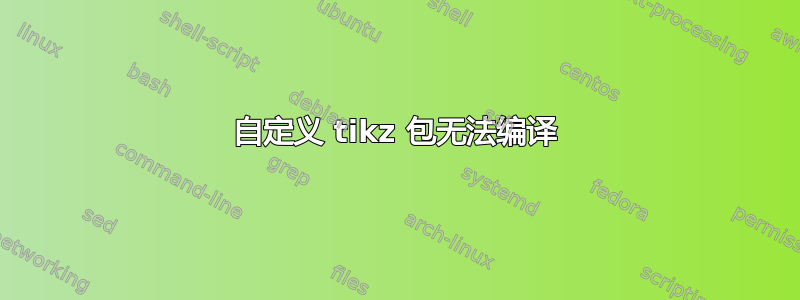
我想包括这个图书馆在我的文档中。单独使用它很好。但是当我包含时,我在 Ball.sty 包中收到一个错误,如下所示:
\ProvidesPackage{Ball}
%%%%%%%%%%%%%%%%%%%%%%%%%%%%%%%%%%%%%%%%%%%%%%%%%%%%%%%%%%%
%This Block can draw small Ball
%Elementwise or reduction operations can be drawn with this
%%%%%%%%%%%%%%%%%%%%%%%%%%%%%%%%%%%%%%%%%%%%%%%%%%%%%%%%%%%
\tikzset{Ball/.pic={\tikzset{/sphere/.cd,#1}
\pgfmathsetmacro{\r}{\radius*\scale}
\shade[ball color=\fill,opacity=\opacity] (0,0,0) circle (\r);
\draw (0,0,0) circle [radius=\r] node[scale=4*\r] {\logo};
\coordinate (\name-anchor) at ( 0 , 0 , 0) ;
\coordinate (\name-east) at ( \r, 0 , 0) ;
\coordinate (\name-west) at (-\r, 0 , 0) ;
\coordinate (\name-north) at ( 0 , \r , 0) ;
\coordinate (\name-south) at ( 0 , -\r, 0) ;
\coordinate (\name-southwest) at ( -0.70710678118 * \r , -0.70710678118 * \r, 0) ;
\coordinate (\name-northeast) at ( 0.70710678118 * \r , 0.70710678118 * \r, 0) ;
\path (\name-south) + (0,-20pt) coordinate (caption-node)
edge ["\textcolor{black}{\bf \caption}"'] (caption-node); %Ball caption
},
/sphere/.search also={/tikz},
/sphere/.cd,
radius/.store in=\radius,
scale/.store in=\scale,
caption/.store in=\caption,
name/.store in=\name,
fill/.store in=\fill,
logo/.store in=\logo,
opacity/.store in=\opacity,
logo=$\Sigma$,
fill=green,
opacity=0.10,
scale=0.2,
radius=0.5,
caption=,
name=,
}
关键行是fill/.store in=\fill,和fill=green,。出于某种原因,我得到了错误
Missing number, treated as zero.
<to be read again>
g
l.55 \newskip\LTleft \LTleft=\fill
A number should have been here; I inserted `0'.
(If you can't figure out why I needed to see a number,
look up `weird error' in the index to The TeXbook.)
有些后续错误是基于第一个错误而产生的。
经过几个小时的调试,我完全不知道是什么导致了这个错误。也许其他人有猜测?
答案1
您不应该将与 Ti 一致的键存储在宏中钾Z 命令\fill。在我看来,最好不要在显式宏中存储任何内容,而是使用\pgfkeysvalueof{...}。因此,您可能希望将其用于Ball.sty。
\ProvidesPackage{Ball}
\tikzset{Ball/.pic={\tikzset{/sphere/.cd,#1}
\def\skv##1{\pgfkeysvalueof{/sphere/##1}}
\pgfmathsetmacro{\r}{\skv{radius}*\skv{scale}}
\shade[ball color=\skv{fill},opacity=\skv{opacity}] (0,0,0) circle (\r);
\draw (0,0,0) circle [radius=\r] node[scale=4*\r] {\skv{logo}};
\coordinate (\skv{name}-anchor) at ( 0 , 0 , 0) ;
\coordinate (\skv{name}-east) at ( \r, 0 , 0) ;
\coordinate (\skv{name}-west) at (-\r, 0 , 0) ;
\coordinate (\skv{name}-north) at ( 0 , \r , 0) ;
\coordinate (\skv{name}-south) at ( 0 , -\r, 0) ;
\coordinate (\skv{name}-southwest) at ( -0.70710678118 * \r , -0.70710678118 * \r, 0) ;
\coordinate (\skv{name}-northeast) at ( 0.70710678118 * \r , 0.70710678118 * \r, 0) ;
\path (\skv{name}-south) + (0,-20pt) coordinate (caption-node)
edge ["\textcolor{black}{\bfseries\skv{caption}}"'] (caption-node); %Ball caption
},
/sphere/.search also={/tikz},
/sphere/.cd,
radius/.initial=0.5,
scale/.initial=0.2,
caption/.initial={},
name/.initial={},
fill/.initial=green,
logo/.initial={$\Sigma$},
opacity/.initial=0.1}
\endinput
正如你所见,它起作用了:
\documentclass[border=3mm,tikz]{standalone}
\usetikzlibrary{quotes}
\begin{document}
\tikzset{Ball/.pic={\tikzset{/sphere/.cd,#1}
\def\skv##1{\pgfkeysvalueof{/sphere/##1}}
\pgfmathsetmacro{\r}{\skv{radius}*\skv{scale}}
\shade[ball color=\skv{fill},opacity=\skv{opacity}] (0,0,0) circle (\r);
\draw (0,0,0) circle [radius=\r] node[scale=4*\r] {\skv{logo}};
\coordinate (\skv{name}-anchor) at ( 0 , 0 , 0) ;
\coordinate (\skv{name}-east) at ( \r, 0 , 0) ;
\coordinate (\skv{name}-west) at (-\r, 0 , 0) ;
\coordinate (\skv{name}-north) at ( 0 , \r , 0) ;
\coordinate (\skv{name}-south) at ( 0 , -\r, 0) ;
\coordinate (\skv{name}-southwest) at ( -0.70710678118 * \r , -0.70710678118 * \r, 0) ;
\coordinate (\skv{name}-northeast) at ( 0.70710678118 * \r , 0.70710678118 * \r, 0) ;
\path (\skv{name}-south) + (0,-20pt) coordinate (caption-node)
edge ["\textcolor{black}{\bfseries\skv{caption}}"'] (caption-node); %Ball caption
},
/sphere/.search also={/tikz},
/sphere/.cd,
radius/.initial=0.5,
scale/.initial=0.2,
caption/.initial={},
name/.initial={},
fill/.initial=green,
logo/.initial={$\Sigma$},
opacity/.initial=0.1}
\begin{tikzpicture}
\path (0,0,0) pic{Ball} (3,0,0) pic{Ball={fill=blue,radius=4}};
\end{tikzpicture}
\end{document}



